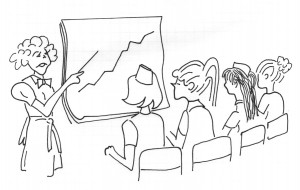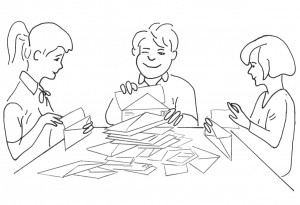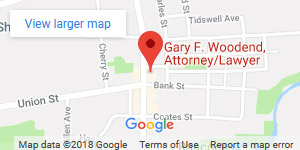Lesson Four — What Are You Selling?
I can often be heard to say, “Everybody is selling something.”That is not meant to be an insult at all. I spent three years of my life just out of college selling for one of the greatest marketing companies of all time, and learned what professional selling was all about. I also learned that selling is not reserved for the “salesman.” Everybody is selling something, and the skills and tools of a salesman can be used in all aspects of your life.
The successful doctor not only needs to bring in patients to make a living, (selling) he or she needs to convince the patients that he or she has made the correct diagnosis and prescribed the appropriate care, (also selling). The lawyer also needs clients and won’t get too far as a lawyer if he or she can’t sell the judge or jury that his client is telling the truth. The best teachers sell their students on the idea that their subject is important. The job applicant has to convince the potential employer that he or she is right for the job. The employee has to sell the boss on a promotion. Whether they are selling themselves, or a product or a service, everybody is selling something.
In the last few chapters, we talked about negotiating. I didn’t want to say so then because I was afraid you might skip over it, but negotiating is a form of selling. What greater sales pitch can there be than trying to wrangle a car from your parents to drive the gang to the movies?
We all have some sales experience. Remember trying to sell those discount cards, or yearbook ads, or Girl Scout cookies? Did they give you any sales training? Heck, no! Here’s what they should have taught you.

Let us suppose that you are trying to sell raffle tickets so you can go on your senior class trip. You knock on the door and explain to the unfortunate and unsuspecting occupant all about the raffle and how you need to sell so many raffle tickets in order to go on the trip. You have the presentation down pretty well, but what do you do at the end of your presentation? You must ask your unsuspecting victim, “Would you like to buy a ticket?” Not should, you must! There are several ways to do this. One way would be to ask, “You don’t want to buy any raffle tickets do you?” You could do it that way, but you would also not be going on the trip because you are not going to sell many tickets. Successful sales people use any one of a number of ways to ask for the commitment, or in sales lingo, ask for the order. This is generally referred to as the “close”.
STOP! Don’t give up on me now. This stuff is not for future sales professionals. This is for you! The sales professional will get this training when their time comes. You need it now! This is so you can compete with them. This is so you can compete and win in almost everything else in life, in school, in work, at home, and in love. Honestly, it fits all of those, and it works. It works very well. Interviewing for a job. Interviewing for college admission. Getting a date. Writing an essay, even. Stick with me.
So, back to our class trip. We were talking about asking for the order, or closing the order. A professionally trained salesperson would not wait until the end to ask the big question. Generally, they would use several trial closings to get the person nodding their head yes, or saying yes along the way. For example, instead of asking once at the end if they want to buy or commit, they would probably ask interim questions like, “Wouldn’t it be nice to go on a Caribbean Vacation?” “Don’t you think that winning a trip would be wonderful?” or “I’ll bet you could use a vacation?” We call these directive leading questions because you are trying to direct the person to the desired answer. Professional salespeople also throw in a few “trial closes” because if the prospect says no to any one of the trial closes, it is unlikely that they are going to buy a raffle ticket, so you might just as well end it early and move onto the next house. Or, as Luke found out with his mother, address the objection. In any case, if you ask leading questions throughout your presentation, it will certainly make it easier to ask the following closing questions at the end:
How many would you like?
What address should we send the winning prize to?
Would you like me to fill your raffle stub out for you or would you like to do it yourself?
Would you like to buy a few extras and use the rest for gifts?
We call these “assumptive closes” because you assume that the prospect or target is going to buy tickets. At least you pretend like the prospect is going to buy some. It makes it harder for someone who is somewhat interested to say no. These may not be appropriate for everybody or in every situation, but they are very useful.
At the very least, you must say, “Can I count on you to support us?” Or, “Would you like to buy a ticket?” And you already know what to say next. Come on, what did we learn from Luke? What do you say after you ask for the order? What do you say after you ask your mother, “If I came home a little earlier, could I go?” Now do you remember? You say nothing. Keep your mouth shut. Just look them in the eye and smile, and look pathetic. Let them answer, because what happens to the person who speaks next? They lose.
Obviously, these same techniques can be used to ask someone to a dance or a party, ask for a raise, or a day off from work, or just about anything else. Let’s try something?
Amy: Bruce, my cousin’s bird watching club is stuffing envelopes tonight for their fall fundraiser. Do you like girls?
Bruce: Girls? Of course I like girls. What does the bird watching club have to do with girls?
Amy: Our members are mostly girls. We can pick you up at 7:00 p.m., or would you like to pick us up?
Bruce: I guess you can pick me up.
Poor Bruce, before he even knew what was happening, he was trapped into stuffing envelopes. What do you think would have happened if Amy asked Bruce straight out if he wanted to stuff envelopes?

This little dialogue between Bruce and Amy leads me to another point.That being, you should never ask a question unless you have a pretty good idea of what the answer will be.In this example, had Amy asked Bruce if he like birds, Bruce might have said yes, but he might have said no.So she didn’t ask.Amy had a pretty good idea that Bruce liked girls.She might just as well have asked if he like cake and ice cream.Amy needed to get Bruce to say yes to a “trial close” before she went for the assumptive close.[We just talked about this.]Let’s try another?
Dad, can I borrow the car tonight.
Dad: No.
Jay: Why not?
Dad: Because I said so.
Jay: Why not?
Dad:You can’t, don’t bug me.
Jay doesn’t seem to be getting too far with dad and the car.Let us try another approach.
Jay: Dad, did you have a lot of close friends in high school?
Dad: Not especially.
Jay:Having friends is a good thing wouldn’t you say so, Dad?
Dad:Sure, Jay, everybody should have friends.
Jay: Dad, wouldn’t you want to know if I was concerned about not having any friends?
Dad:I guess so, Jay.Why, what’s up?
Jay: Well, two guys I know from school were really counting on going to the mall tonight, but nobody can get a car.And I was hoping to borrow the car tonight.Can I run any errands for you while I’m out?
Nice job, Jay.Obviously, Jay has a much better chance by using a few trial closes and an assumptive close than he would using his first method, whatever that method was, perhaps badgering would be an appropriate title.
Using the proper questioning technique is essential to getting your way.It is best to plan out the conversation in your mind before you start.Do a dry run or two.Role-play.Practice on the dog.This gives you a great advantage over your target.Jay’s father didn’t know that Jay would be asking for the car, but Jay did.Jay had time to think about the conversation and the possible responses he might get from his father.Before you start out, you should run through the possible responses you might get and how you are going to handle these responses or objections.Using this simple method, you will not win every time, but your chances for success in everything you do will be greatly improved.





